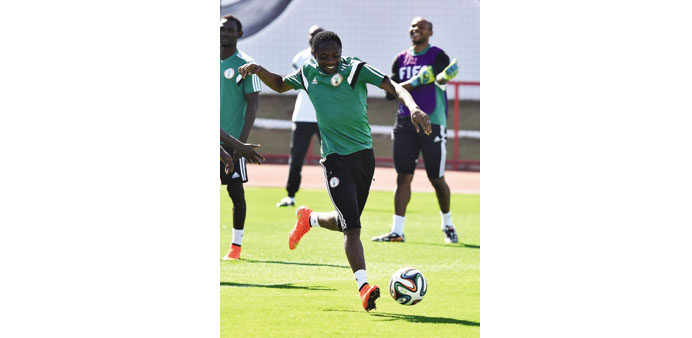Nigeria forward Ahmed Musa runs with the ball during a training session in Brasilia.
In the days prior to the kick-off of the 2014 World Cup, international sports pundits peered deeply into their crystal balls, cobbled statistics together and declared that perhaps none of the five qualifying African nations would advance to the final group of 16.
There were others causes of concern for Nigerians. In a country where football is best enjoyed in outdoor venues doing a brisk trade in chilled drinks and small chops, the authorities in Adamawa State ordered all businesses with plans to screen live coverage of the competition to close down due to bomb threats from Boko Haram.
Yet none of this was enough to curb the national enthusiasm. On the surface of it, we just wanted to enjoy the most important sporting competition of all. On a deeper level, with Boko Haram wreaking havoc on the country -- bomb explosions have become almost a weekly affair; the 200 abducted schoolgirls from Chibok are still missing, as are those who have been abducted since -- we desperately needed something to distract us, even for a little while, from focusing on just how badly things were going. As fiercely optimistic as always, we hoped that not only would at least one African nation prove the pundits wrong, but that that country would be Nigeria.
Nigeria’s first match, a tedious affair, ended in a cheerless goalless draw against Iran, the first of the tournament. Nigerians, like fans the world over, took to social media to bash Stephen Keshi, the national team manager, to advise him on which players to drop and who to replace them with, point out where his game strategy went wrong and how not to play in the next match. The second game, against Bosnia Herzegovina, had Nigeria win by a single goal to nil. This was the bright light we had been seeking.
Throughout Nigeria, in any place where people could still gather in large groups, they were rejoicing and hailing the players, regardless of their ethnic group or religion. Nigerians joked on social media that the ruling party (PDP) would claim it as their victory (part of the “transformation agenda” of President Goodluck Jonathan) and sure enough, the president’s PR people put up a photo on Twitter of the great man watching the game and celebrating the victory surrounded by acolytes.
For a brief moment, all our dreams and wishes for Nigeria seemed possible: the abducted Chibok girls would be returned; Boko Haram members would be flushed out and an end put to their activities; there would be uninterrupted power supply in every city of the nation; pensions would be paid; unemployment figures would fall drastically it no longer seemed naive to be optimistic about our Nigeria. Our pride in our country was absolute.
A friend who previously always had problems whenever he travelled on his Nigerian passport posted on Facebook the next day how he had been accorded unusual respect by Ghanaian immigration officials and South African Airways staff. Another friend demanded that the Nigerian goalkeeper, Vincent Enyeama, be honoured with a chieftaincy title. I stayed up late, retiring only after 3am, wanting to extend that day for as long as I possibly could and bask in the fuzzy warmth of our success.
I really should have stayed in bed nursing those dreams. The next day, as if determined to take the shine off our joy, Boko Haram allegedly kidnapped 60 village women and killed about 30 men. “Allegedly” because the government denies this happened, but the villagers swear it did. The government, sadly, does not have a solid reputation when it comes to information about abductions and rescues. The news was as a pinprick to the balloon of our happiness. But we still had something to look forward to. There was the match against Argentina, which we hoped would see us advance to the final 16.
With dreadfully efficient, if cynical, timing, Boko Haram struck again just before the start of the match against Messi and co, first, in Adamawa, killing one person, and then at the popular Abuja Emab mall, killing 22 people and injuring 17. The Abuja attack occurred just as people rushed home to catch the match. I had my TV on, vaguely listening to the punditry while waiting for kick-off but once news broke of the bomb blast, my appetite for football disappeared. I have friends and family in Abuja. I wondered if they were OK. I sent out e-mails and made phone calls. Fortunately for me, every single one of them was fine. One had been at the mall that day but, thankfully, had left well before the blast.
A friend’s friend, though, had gone to the mall to pick up a mobile phone he was having repaired, hoping to rush back home in time for the match. He never made it, leaving behind a devastated wife and two young children. I was relieved nobody I knew had been killed or maimed, but relief was followed by guilt for feeling relieved.
In the middle of all this sadness, however, is it wrong for me to admit I am pleased that Nigeria advanced to the knockout stage of the World Cup? We could do with more of these moments of happiness to forget our many divisions, and Boko Haram, and an ineffective government that reportedly pays $1.2mn to a US firm to “boost its perception around the world”.
It’s good simply to live in the moment. Such moments are becoming so few and far between that it is little wonder that each is clung to, magnified and extended for as long as is humanly possible.
(Chika Unigwe won the Nigeria prize for literature for her novel On Black Sisters’ Street)

